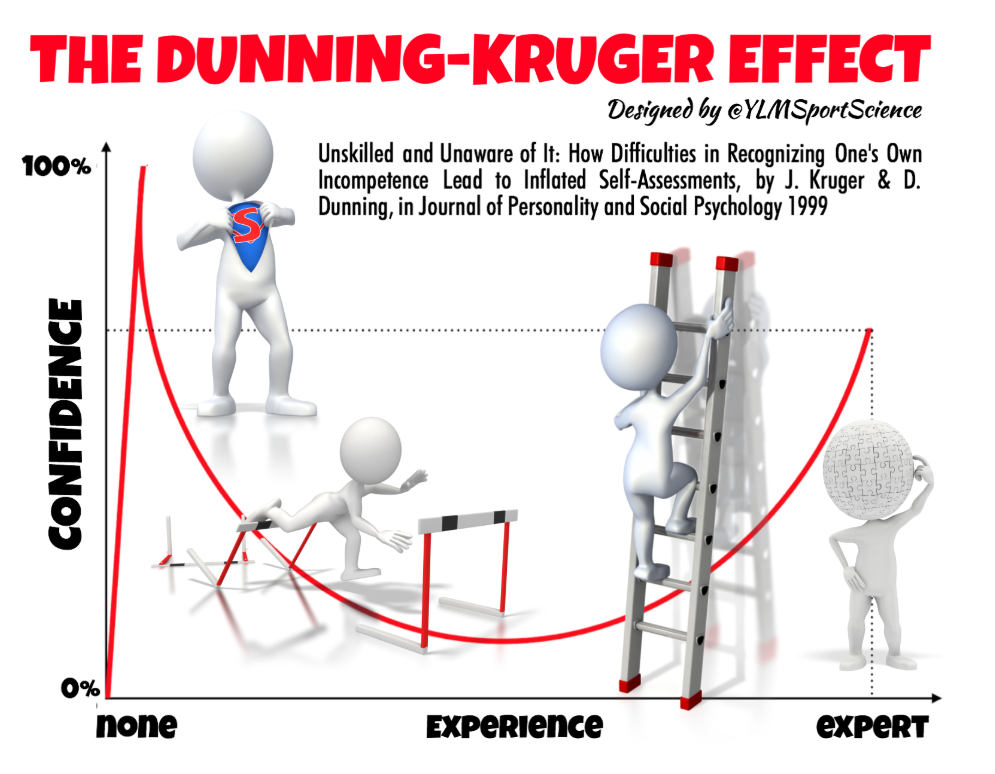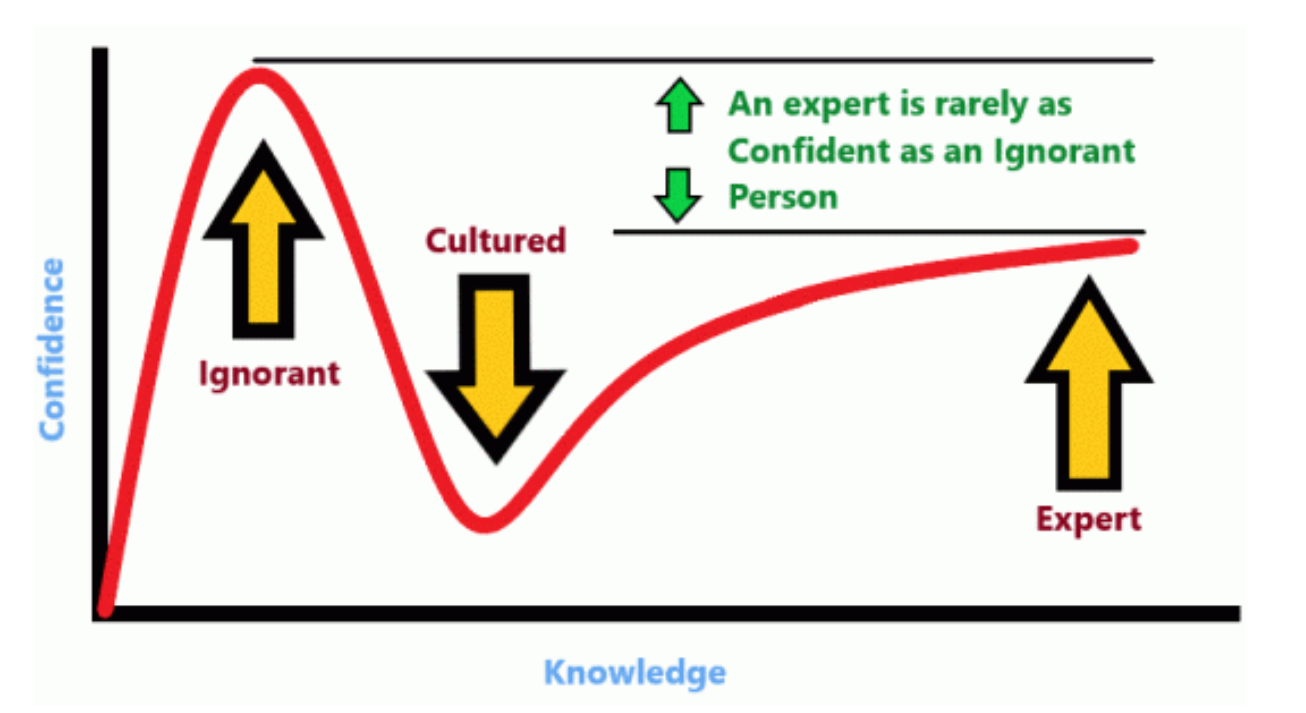
Dunning – Kruger effect
in Technical diving….
Article: George Petrou (Advanced Trimix Instructor Trainer / 3*** CMAS - Explorer)
The Dunning-Kruger Effect in Technical Diving
Article: George Petrou February 2025
The Dunning-Kruger effect is a cognitive bias in which individuals with limited skills develop an illusion of superiority, mistakenly believing their cognitive abilities are greater than they are. This phenomenon has "application" across the entire spectrum of human nature, from the simplest to the most demanding activities.
Antiquity: "Know thyself"
"According to Plato's Charmides, this is the oldest of the three Commandments engraved at the entrance to the Temple of Apollo at Delphi. The traveler Pausanias' description of Delphi confirms its existence. Opinions vary on the origin of 'gnothi sautton'; Socrates' 'gnothi sautton' is a key phrase of humanism because it assigns to humans the duty to know their own measure without trying to compete with the gods."
"The Man"
One of the major problems of human nature is not recognizing:
- Its weaknesses – Shortcomings
- The measure of its limits.
Whether unconsciously or intentionally, the two above elements indicate a lack of self-awareness and are very important because the level of demands that Scuba Diving, and especially Technical Diving, has, is very high.
Overestimating our capabilities in a simple daily activity might just result in failure, but in technical diving, it can be catastrophic or even fatal.
Therefore, this is our Achilles' heel, or in other words, a weak point in our safety.
What happens in the Dunning-Kruger effect is that incompetent people usually:
- overestimate their abilities, knowledge, and themselves
- they are unable to recognize their own lack of skills
- fail to recognize the extent of their inadequacy
- fail to accurately assess the skills of others
- They recognize their own lack of ability only after being exposed to the skill in action.

On the other hand, experts in a field often underestimate their knowledge and abilities or believe that others around them are at a similar level.
This is because the more they learn about a topic, the more they realize how complex it is and how much they still have to learn.
Most interestingly, the least capable are usually the ones who overestimate their abilities to the greatest extent. People who are proven to be poor at logical reasoning, grammar, financial literacy, mathematics, emotional intelligence, medical laboratory testing, and chess all tend to rate their knowledge almost as favorably as actual experts.
Who is Vulnerable?
So who is most vulnerable to this delusion? Unfortunately, all of us, because we all have gaps of incompetence that we don't realize. But why?
When psychologists Dunning-Kruger first described the phenomenon in 1999, they argued that people who lack knowledge and ability in a subject suffer from a double "curse." First, they make mistakes and make poor decisions. And second, it is precisely these cognitive gaps that prevent them from identifying their mistakes. That is, poor performers lack the appropriate knowledge that would allow them to understand how badly they are doing.
David Dunning
Justin Kruger
"The Diver"
If we look at it from our own perspective, diving involves theoretical and practical, realistic questions such as:
- Anything anyone else does, I can do too?
- Can I dive deeper than the maximum depth allowed by my certification?
- Can I follow a group of experienced divers at a great depth, certified for that level, to a depth that I am not certified for?
- Can I use Nitrox or Trimix, Triox, Tetrox without training, certification, experience?
- Can I go in and explore a cave or shipwreck after mentoring?
- Can I do deep diving but especially ascents in the blue and especially without a line without being a Decompression Diver?
- Can I do dives that require decompression?
- Can I change the Presets, for example the Gradient Factors, of my Dive Computer?
- Can I mentor? Can I dive with someone who is untrained without being an instructor?
I know everything and I do everything better than anyone!!!
The diving questions can be endless. Knowing realistically how capable we are and how our abilities stack up against others is more than just a self-esteem booster. It helps us understand when to go with our decisions and instincts, or when to seek advice. But psychological research suggests that we're probably not very good at accurately assessing ourselves. In fact, we tend to overestimate our abilities. Researchers call this the Dunning-Kruger effect.
The admission of "I Can't - I Don't Know" is a very difficult personal condition for many people. And yet this is the crucial point, and the factor that will protect us from either being exposed to or experiencing traumatic situations.
Historical Context
This bias was first observed experimentally by David Dunning and Justin Kruger from Cornell University, in 1999. It is accepted that the effect is the result of internal illusion in the unskilled, and external misunderstanding in the experts: "The misjudgment of the incompetent results from an error concerning himself, while the misjudgment of the highly competent results from an error concerning others."
The study was initially inspired by the case of MacArthur Wheeler, a man who robbed two banks while covering his face with lemon juice, in the mistaken belief that because lemon juice could be used as invisible ink, it could prevent his face from being recorded by surveillance cameras. The authors noted that previous studies have shown that ignorance of performance standards is behind a large amount of inaccurate self-assessment of competence.
Dunning has since drawn an analogy – "the Anocognition of Everyday Life" – to a situation in which a person experiencing a physical disability due to brain injury seems to ignore or deny the existence of the disability, even for dramatic disabilities such as blindness or paralysis: "If you are disabled, you cannot know that you are disabled... The skills you need to lead yourself to a correct answer are precisely the skills you need to recognize what the correct answer is."
Historical Observations
Although the Dunning-Kruger effect was formalized in 1999, previous observations in the same direction have been noted by philosophers and scientists such as:
- Confucius ("true knowledge is to know the extent of ignorance")
- Bertrand Russell ("One of the painful things about our time is that those who feel certain are stupid, and those with imagination and understanding are filled with doubt and indecision")
- Charles Darwin, referring to their original study ("Ignorance more often breeds confidence than knowledge")
Fuller, commenting on the study, pointed out that Shakespeare expressed a similar observation in As You Like It ("The fool doth think he is wise, but the wise man knows himself to be a fool" (V. i).
Reality's Limits
But where are the limits of reality?
Where does healthy optimism end and Psychopathological Overoptimism begin? Without optimism, the belief in ourselves and that we are worthy and capable of achieving a goal, nothing moves and nothing can be achieved. It is the driving force in life.
Who among us has not overestimated his capabilities? Who does not secretly believe or fantasize that he is better at everything and capable of everything? 'We all have this Narcissistic tendency in our DNA. 'We all want everything to be done according to our need and mood alone. But this is not possible.
This situation can make you great but also destroy you.
But on the other hand, Mediocrity, conservatism, and absolute inaction and protection from everything is almost a slow, small death, as in this way you will only know and enjoy a few of the beauties and pleasures of this short life of ours.
So the METRO is the key to our lives. Our balance, our security.
"Παν μέτρον άριστον" ή "μέτρον άριστον;"
The saying seems to have been said by Cleobulus of Lindos (6th century BC) and its first formulation was "Metron ἄriston" where it meant to avoid extremes and observe moderation in our lives.
"Measure", then, in nutrition, without deficiencies but also without excesses, which turn good into bad. As "excellent measure" the saying was probably originally formulated by Cleobulus of Lindos, with which he urges us to use our nutrition in the right way, both in quantity and quality. Let us note here that "excellence" is a definition that refers only to something "good". It makes no sense and no sense to try to find "excellence" in something "bad", "bad".
The essential meaning of the saying "metron ariston" is that the good and the good have practical difficulty in measuring, assessing and determining their correct use. Excellence in today's culture applies not only to meeting individual and social needs but also to the needs of technology and production.
The Babiniotis Dictionary considers "Metron ἄriston" to be correct, but does not reject "Pan métron ἄriston" as incorrect.
Cleoboulos of Rhodes
Cleoboulos of Rhodes
Για να επιστρέψουμε στο θέμα μας....
Let us not forget that underwater, as a SCUBA diver, he is constantly supported by M.A.Y (Mechanical Respiratory Support) whether he dives with an open or closed circuit. Only the free diver is self-supported, relying only on his apnea and the management of the Oxygen/Carbon Dioxide ratio.
The important thing for a scuba diver is to:
- Knows his physical & psychological limits
- Have the certification which confirms the depth he can dive, the time he can stay there, the conditions that must prevail in the environment inside and outside the bottom
- The activities it may carry out
- To feel good
- To comply with safety rules and measures
- Be perfectly in harmony with the pair or group with whom he dives
- Have experience
Technical Diving
And we leave general diving and go to the heart of our topic, which is Technical Diving. Here the requirements are many and at all levels:
- Procedures
- Environment
- Equipment
- Design
- Cooperation and anything else
- Physiology & Psychology
- Judgment and decision-making
Attention:
Diving with a stage, touring around a shipwreck & entering two or three of its rooms, going a few meters into a cave does not automatically mean that you are a technical scuba diver.
Diving deep with mixed gases with full equipment and organization, penetrating a shipwreck in length and depth, penetrating a cave or cave system in length and depth and especially doing pioneering exploration, these are Technical Diving. It may sound strict, excessive and aphoristic but it is a demarcation that we must recognize. Wearing a dry suit, having double Hi-Tech Dive computers, double tanks or Rebreathers does not necessarily make you a technical scuba diver.
If the Dunning-Kruger phenomenon in everyday life can simply bring us to a frustrating position, in recreational diving it can put us in trouble and danger, but in technical diving there are no such leeway. Any overestimation and mistake can result in very traumatic consequences, disability or even death.
Basic Safety Rule:
It is to always have a margin of safety in our diving and never be marginally exposed at all levels.
Technical diving is made up of some basic characteristic elements such as:
- Deep diving
- Mixed gases and Mixture changes such as Enriched Air Nitrox, Triox, Trimix, Tetrox
- Equipment, Rebreathers
- Caves
- Shipwrecks
- Production of a project either by selection or without selection
- Couple, group
- Unpredictable factor
- Combination of all of the above
Adjustment Syndrome
Hungarian scientist and researcher Hans Seyle defined the General Adaptation Syndrome (GAS) as the body's typical response to stress. In a 1946 article in The Journal of Clinical Endocrinology, he described his theory that GAS is the body's way of reacting to a perceived threat as a way of survival.
The three stages of GAS are:
- Alarm response stage
- Resistance stage
- Exhaustion stage
Stages of General Adaptation Syndrome - fight-flight-freeze-or-fawn
General adaptation syndrome occurs in three stages. In each of these stages, your body reacts in different ways. The physiological changes your body goes through during this process can have long-term negative effects.
Alarm Response Stage
This is the first stage of the general adaptation syndrome. In this stage, your body sends a distress signal to your brain. Your brain responds by sending a message to the body by releasing hormones called glucocorticoids and adrenaline. These are also known as the "fight or flight" hormones. During the alarm response stage, you will also experience increased blood pressure and heart rate.
Signs during Alarm Response Stage:
- Increased blood pressure
- Accelerated heart rate
- Dilated pupils
- Heightened sensations
- Skin rashes
Resistance Stage
The resistance stage appears after the reaction stage. During this stage, your body tries to prevent the changes that occurred during the reaction stage using the parasympathetic nervous system. This usually happens when whatever was triggering your stress has stopped.
Signs during Resistance Stage:
- Irritability
- Poor concentration
- Nervousness
Exhaustion Stage
The exhaustion stage occurs after prolonged stress. Here, even if the stressor persists, your body is too exhausted to continue fighting it. This is the most dangerous stage of general adaptation syndrome, as this is where you are most susceptible to developing health conditions.
Signs during Exhaustion Stage:
- Worry
- Cognitive difficulties
- Depression
- Fatigue
- Insomnia
VIOLIN SCENARIO WITH INCIDENT
So let's look at a fantastic scenario, which has happened countless times to technical scuba divers, no matter how extreme it may seem to you.
"I am an Extended Air Diver with many deep dives. I have done much deeper dives with my friends who are more experienced than me, and between us, I have reached 60 meters...."
The Scenario Unfolds:
- I dived alone to 70 meters
- Using mixed Trimix gases with deep Narcotic depth
- Lost track of depth and time
- Mandatory deep stops not in the program
- Insufficient gas reserves
- Emerging in blue water without a line
- Strong mid-ocean current
- Lost orientation with compass
- Dangerous depletion of bottom mixture
Realizations:
- I am dangerous to myself and others
- I lack the training and experience for such dives
- I greatly overestimated my abilities
- Previous successful deep dives were a trap
- I am a classic example of the Dunning-Kruger Effect
Epilogue - Complexity Requirements
It is a fact that we have all made mistakes and will continue to make mistakes in diving, and Grafon is the first. The purpose of each such article is to analyze a phenomenon, in this case the Dunning-Kruger phenomenon that "shaped" it for us, and to distinguish it, to identify its applications in Technical Diving. Even if one scuba diver is seriously concerned and a diving accident is avoided, it is a gain for all of us.
Diving is a source of happiness but it also has its dark side.
Anyone who would like any clarification or has any comments on the above can send me a message at georgedpetrou@gmail.com.
Thank you for reading.
George Petrou
Sources:
- Archive: George Petrou / HUE
- https://el.wikipedia.org/
- https://braining.gr/
- https://www.psychology.gr













